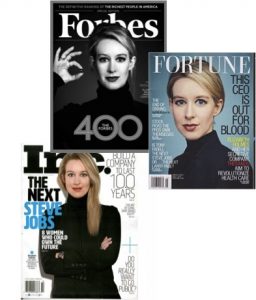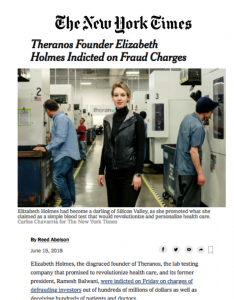[Editor’s Note: This post deviates from my typical form. It’s purely an essay, no data viz. Thanks for reading as I try out something new.]
I first saw Elizabeth Holmes at a small health data conference in 2013. I went to these kinds of events often for work, and the typical entrepreneurs I encountered were “health app” developers. They gameify-ed your health goals, used your camera to track food, synced your music to your running pace. Most were flashy software products that, to me, didn’t do anything.
Theranos, the biotech company Elizabeth dropped out of Stanford to found at age 19, seemed totally different.

Theranos wasn’t just 0’s and 1’s on a smartphone. It was a company creating actual physical machines – a miniature laboratory device that could operate off of just a drop of blood from your fingertip (rather than a typical blood draw, with a needle in your vein). This technology promised to significantly reduce costs by automating previously human-intensive lab work, and had the potential to improve access to critical test results in places where laboratory testing facilities weren’t easy to find. Elizabeth even talked about having these tiny units in people’s homes, where a person could log longitudinal blood samples to predict disease onset and prevent adverse trajectories (be still, my data-loving heart!).
I was attending the conference on behalf of the cancer hospital I worked at, and as I sat in the audience, I was thinking about the dozens of blood draws cancer patients endure during their course of treatment. All the trips to the central laboratory while suffering from illness. The potential for these tests to detect cancer sooner. Theranos could completely revolutionize the patient experience. I could see it. The conference attendees, myself included, threw around the word “disruption” with so much certainty that it was basically in the past tense.
Unfortunately, it was all a sham. But we didn’t know that yet.
A Recovering Impostor Myself
I was 26 at the time – just three years younger than Elizabeth herself. I was earnest and optimistic and uncynical. Medical devices and laboratory testing weren’t areas I was knowledgeable about, but I was still captivated by Elizabeth.
Here was a woman roughly my age, my gender, and frankly kind of looked like me, putting forward such confidence in her ideas. She had made a name for herself as a healthcare entrepreneur, in a Silicon Valley world composed mostly of men who were mostly designing iPhone games. Honestly, if she had taken my business card that day and called me with a job offer, I probably would have moved cross-country to take it.
I suppose I was vulnerable to a leader like Elizabeth. I was living in New York City, 1200 miles from my home state of Nebraska. The day I moved, I had a meltdown alone in a U-haul, stuck in post-Yankee game traffic, unable to find a parking spot (doy, self). I felt in over my head in all aspects of life. Navigating the city, learning a new job, forging an identity for myself outside of being a student. When you’re in school, especially when you have math-heavy coursework, you always got clear feedback. You had the right answer, or you didn’t. In the real world, I felt doubt and uncertainty about whether I was doing a good job.
One morning on my subway commute, I was reading Tina Fey’s book, Bossypants. That’s when I learned a new term: “impostor syndrome.” Essentially, a person experiencing impostor syndrome has deeply ingrained insecurity. She believes she’s a “fraud” despite her actual competence or past successes. These beliefs persist even for a woman with a proven track record, because she tells herself that past successes were lucky, that competence on a future task is uncertain. Impostor syndrome is most often described in a professional context, but it can extend to all sorts of environments and events.
I was blown away that Tina Fey – this beautiful, hilarious, successful, universally-admired woman – had persistent self-doubts. When I gathered the courage to talk about my own insecurities with female friends and colleagues, almost everyone related. Impostor syndrome was ubiquitous, even among women I knew personally as self-composed and successful.
With time, experience, and lots of happy hours venting with female confidants, I became a person who could psych myself up with little pep talks. I would try to remember that I wasn’t the only one who felt like I was just guessing what to do next, that others aren’t doubting me like I doubted myself, that I shouldn’t self-deprecate when I earned a success. Now at 30-something years old, I can say simple sentences like, “Yes, I’m excellent with Tableau software,” and not feel like a total fraud or an egomaniac.

Despite my own progress, I still felt frustrated that my male counterparts rarely succumbed to impostor syndrome – rather, if they did feel similar inner doubts, men were more likely to still exude confidence and strength. (Yeah, all that Sheryl Sandberg Lean In goodness.) To this day, I go to data conferences and hear executives talk about how amazing their “data guys” are, which completely stokes my insecurity as a female in a male-dominated field.
In those moments, I turned to female role models who had the confidence and strength and thick skin that I strove to find within myself, especially females making headway in typically “male” professions. Tina Fey is one of those people. So is Sheryl Sandberg. And up until about 18 months ago, Elizabeth Holmes was another.
The True Theranos
Flash forward to today. I’m one-third of the way through John Carreyrou’s book Bad Blood: Secrets and Lies in a Silicon Valley Startup, about the toxic workplace culture and (probably criminal) recklessness that Theranos undertook with Elizabeth at its helm. Hell, I’m not even to 2013 yet in the book’s timeline – the year I saw Elizabeth – and I am totally overwhelmed by the stories of Theranos overpromising results, mistreating employees, and fostering a paranoid and secretive culture.
But it’s not just that Theranos was talking a big talk. They moved forward with actual shoddy implementations: using the faulty device in pharmaceutical clinical trials, collecting samples from patients suffering from SARS in third world countries, providing blood test results in actual clinics. The devices would frequently return an error message due to malfunction, and were much more finicky than the investor demo suggested. It’s like HQ Trivia having technical difficulties during a live game, except it’s your blood going to waste and your medical results being delayed.

But even when it could generate a result, the Theranos device was untrustworthy. Theranos never validated that their tests were accurate. I want to pause on this fact. This isn’t just regulatory red tape or methodological hand-wringing. Wrong results affect people’s lives, and affect the medical decisions they make. I just read a section of the book where a man received results from Theranos indicating that he almost certainly had prostate cancer. But the results were totally wrong; a second test done by an outside lab revealed he was, in fact, at very low risk. That kind of error went unexamined and unfixed at Theranos. It’s sickening.
And I’m not even to 2013 in the book, the year Elizabeth was headlining major conferences around the world.
While I haven’t gotten to the later chapters yet, I already know some “spoilers” from following Theranos over the years. In 2016, the federal government enacted sanctions against Elizabeth, banning her from owning or operating any clinical laboratory for two years for failing multiple lab inspections. Last week, Elizabeth was indicted by U.S. federal court for fraud and could face jail time.
My Gut Reaction
I’ve been absorbed in Theranos news now more than ever. But I’m having difficulty putting my finger on what is so gut-wrenching to me about these recent charges.
Maybe I feel relief because it seems like such a close call, like I could have been wrapped up in it myself. Maybe it’s because I thought I admired Elizabeth, and it sucks watching a hero turn out to be a con. For a minute I worried the un-nameable feeling was schadenfreude – but honestly, every bone in my body wanted to see Theranos succeed and to see Elizabeth rise as a healthcare cult hero.
Well then, what is this feeling I’m experiencing? I think it may be rooted in my attempts to put impostor syndrome behind me. Yes, in an effort to overcome self-doubt, I’ve definitely portrayed more confidence than I truly felt inside. Yes, I’ve promised I could deliver something that wasn’t strictly at my fingertips, but I took a risk that I could figure it out. I’ve stood up for my ideas, even when I was scared I’d get shot down.
The news about Theranos has made me feel a bit like … if Elizabeth was actually an impostor, then maybe I’m actually an impostor. Elizabeth portrayed more confidence about the product than reality, she promised results that weren’t ready, she defended her ideas against critics. And she is literally being charged with fraud. Are we so different?
Embracing My Inner Impostor Voice
Earlier this year, I was sending out a pretty boring internal monthly report. (By far the least glamorous part of my day job.) But I messed up. I made a pretty glaring mistake in my code, and I didn’t catch it before sending along to physician leads at each of our 14 hospitals. That night, after I had already gone home and settled on my couch to watch an episode of Grey’s Anatomy, an email from one of the report recipients made me realize my error.
I felt like total garbage. I felt like I had disappointed my clients and my boss. I wanted to crawl under a desk and hide. In reality, all I had to do was reissue the reports the next morning (with an explanation, an apology, and a heads up to my boss), but I was so afraid that people would see through me.
Sure enough, that voice was back. “You’re not a real analyst. Even the most basic programmers would have double-checked the output before sending. Good luck getting people to trust your work.”
Maybe the fact that my impostor voice persists, even after all these years, is what separates me from the Elizabeths of the world. I don’t love that this voice makes me feel doubt and insecurity. But maybe, when wielded in small and constructive doses, it can a force for good. As Richard Webber’s character in Grey’s once advised to a cold-footed colleague on her wedding day: “Overwhelming doubt is a problem. A little doubt is the sign of an intelligent adult.” And maybe no doubt at all is problematic, too.
Here’s what I’m thinking. Instead of letting my voice tell me, “You’re not qualified to do this big important project,” I can respond to it with, “Ah, this project is really big and important, let’s see what I can do and how I can contribute.” Instead of steamrolling with a false confidence, maybe my voice will remind me, “This is going to affect other people, are you sure you don’t want to talk about the caveats, or ask for help?” Maybe when I get too focused on my failures, I tell that voice, “People are OK if you can’t deliver perfection 100% of the time – but you do have to admit your mistakes and learn from them.”
To completely squelch the voice of doubt would make me a sociopath. To live symbiotically with the voice would probably make me more mature and effective.
Letting Elizabeth go as a role model also makes me wonder if I should revisit my role model roster altogether. Instead of looking up to celebrities, I should look up to my brilliant coworker who is thoughtful, creative, and killing it in her department. Instead of admiring a stranger, I should admire my friend who is a fearless negotiator. I should be grateful for my mentors in previous jobs, who took chances on me by giving me responsibilities that I didn’t even know I could handle. That is, in moving away from the celebrity role models of my 20’s, I can make room for these everyday heroes I’m lucky to know.
But I swear, if Tina Fey turns out to be a felon? I might snap.